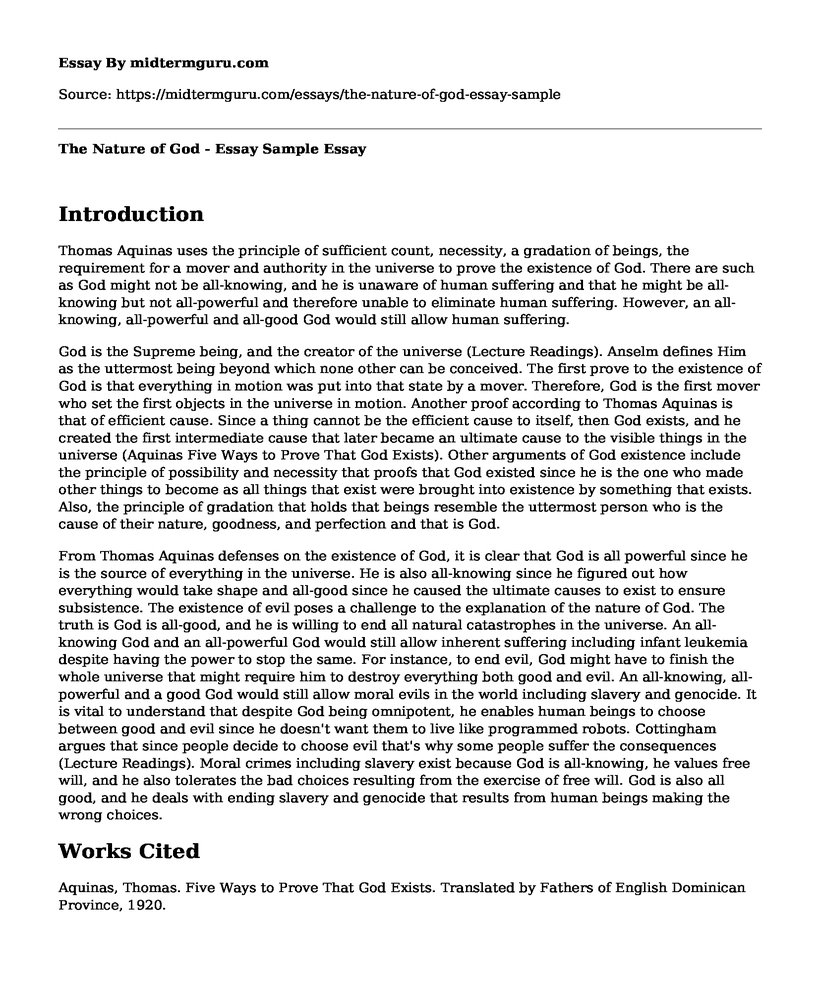Introduction
Thomas Aquinas uses the principle of sufficient count, necessity, a gradation of beings, the requirement for a mover and authority in the universe to prove the existence of God. There are such as God might not be all-knowing, and he is unaware of human suffering and that he might be all-knowing but not all-powerful and therefore unable to eliminate human suffering. However, an all-knowing, all-powerful and all-good God would still allow human suffering.
God is the Supreme being, and the creator of the universe (Lecture Readings). Anselm defines Him as the uttermost being beyond which none other can be conceived. The first prove to the existence of God is that everything in motion was put into that state by a mover. Therefore, God is the first mover who set the first objects in the universe in motion. Another proof according to Thomas Aquinas is that of efficient cause. Since a thing cannot be the efficient cause to itself, then God exists, and he created the first intermediate cause that later became an ultimate cause to the visible things in the universe (Aquinas Five Ways to Prove That God Exists). Other arguments of God existence include the principle of possibility and necessity that proofs that God existed since he is the one who made other things to become as all things that exist were brought into existence by something that exists. Also, the principle of gradation that holds that beings resemble the uttermost person who is the cause of their nature, goodness, and perfection and that is God.
From Thomas Aquinas defenses on the existence of God, it is clear that God is all powerful since he is the source of everything in the universe. He is also all-knowing since he figured out how everything would take shape and all-good since he caused the ultimate causes to exist to ensure subsistence. The existence of evil poses a challenge to the explanation of the nature of God. The truth is God is all-good, and he is willing to end all natural catastrophes in the universe. An all-knowing God and an all-powerful God would still allow inherent suffering including infant leukemia despite having the power to stop the same. For instance, to end evil, God might have to finish the whole universe that might require him to destroy everything both good and evil. An all-knowing, all-powerful and a good God would still allow moral evils in the world including slavery and genocide. It is vital to understand that despite God being omnipotent, he enables human beings to choose between good and evil since he doesn't want them to live like programmed robots. Cottingham argues that since people decide to choose evil that's why some people suffer the consequences (Lecture Readings). Moral crimes including slavery exist because God is all-knowing, he values free will, and he also tolerates the bad choices resulting from the exercise of free will. God is also all good, and he deals with ending slavery and genocide that results from human beings making the wrong choices.
Works Cited
Aquinas, Thomas. Five Ways to Prove That God Exists. Translated by Fathers of English Dominican Province, 1920.
Lecture Readings. Anslem and the Ontological Argument.
Lecture Readings. Cottingham John on the Meaning of Life.
Cite this page
The Nature of God - Essay Sample. (2022, Sep 06). Retrieved from https://midtermguru.com/essays/the-nature-of-god-essay-sample
If you are the original author of this essay and no longer wish to have it published on the midtermguru.com website, please click below to request its removal:
- Migration Theology
- Essay Sample: Fridays Black Moon Believed to Herald the End of the World
- Research Analysis of Dan Browns View of Christianity - Paper Example
- The Book of Mathew Analysis Paper Example
- "Wanton and Senseless? The Logic of Algerian Massacres" by Stathis Kalyvas - Critical Essay
- Personal Statement - Master of Art in Theology and Philosophy
- Christianity: World's Leading Religion With 31.5% of Global Population - Research Paper







